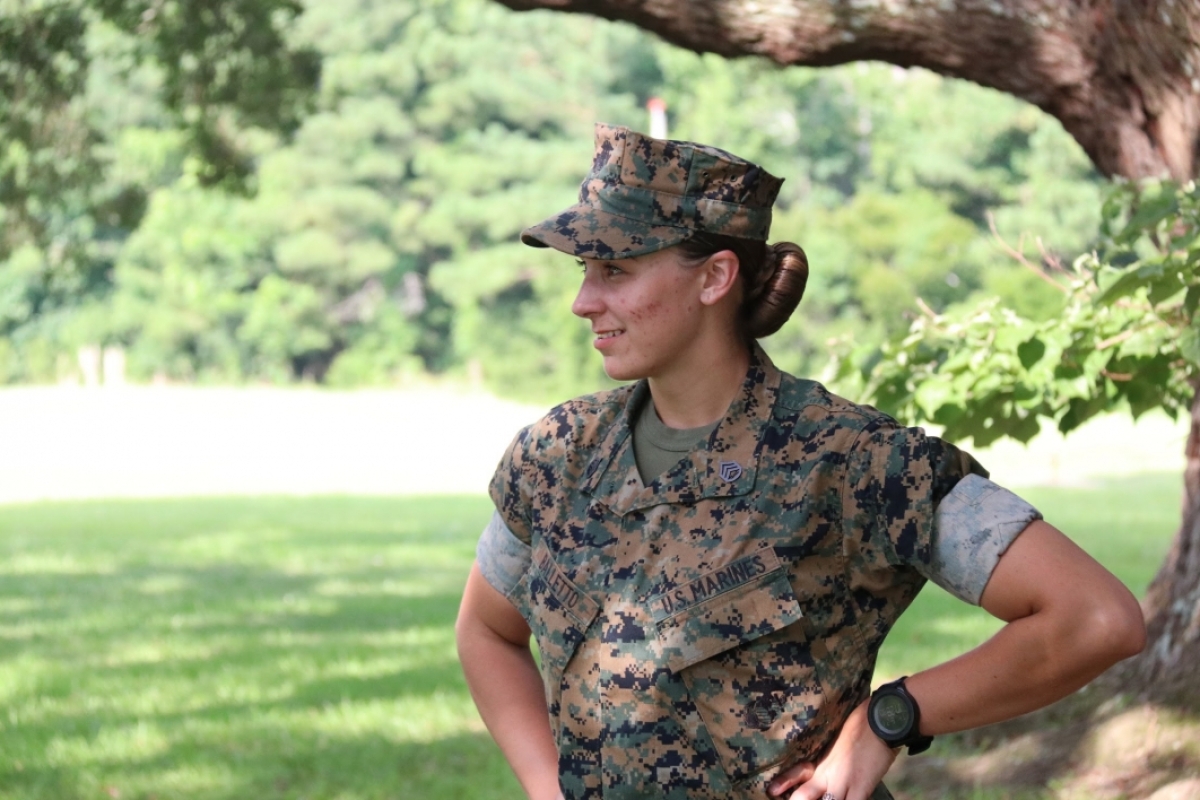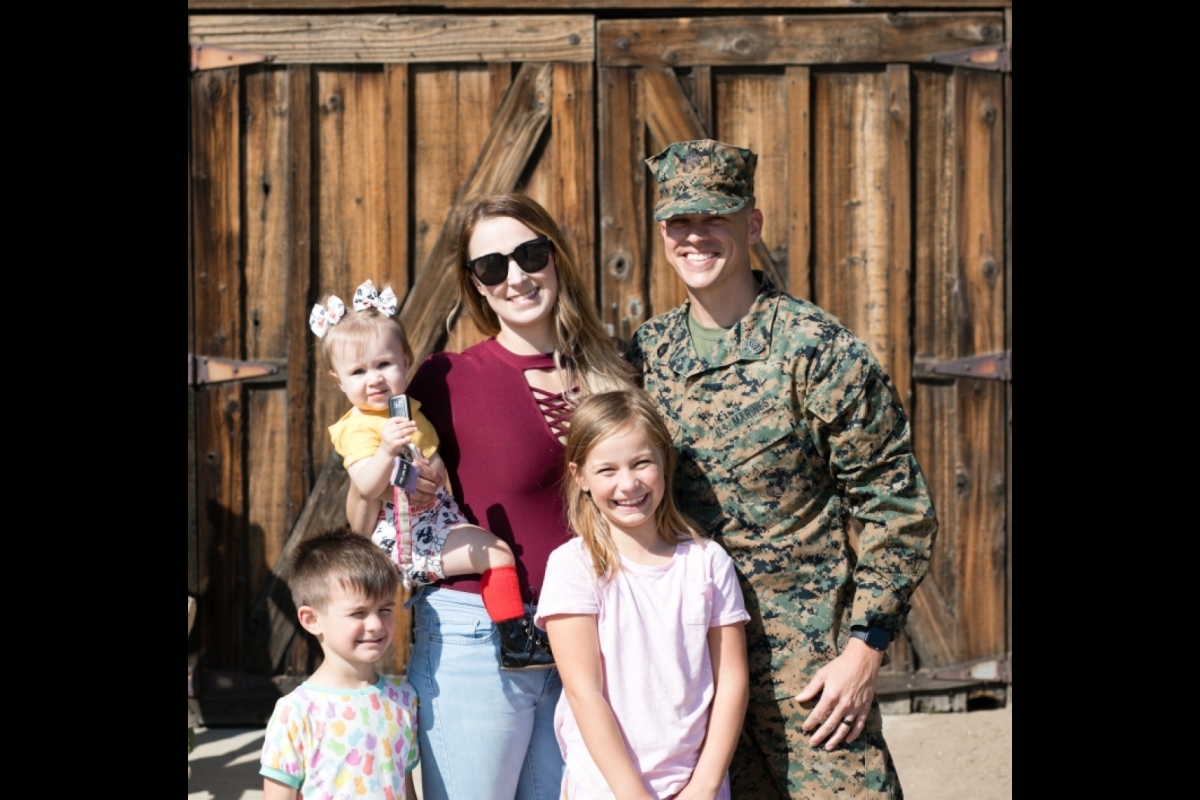ASU School of Molecular Sciences military veteran graduates this summer

Nicola Osgood graduates this summer as a School of Molecular Sciences online biochemistry major.
Editor's note: This story is part of a series of profiles of notable spring 2021 graduates.
Nicola Osgood began her ASU career while still on active duty in the U.S. Marine Corps. Fortunately she was able to enroll as a biochemistry major in the School of Molecular Sciences’ world-class online degree program, and Osgood took full advantage. She was frequently found studying at work, on the rifle range — in fact anywhere she could squeeze in a moment or two with a textbook.
“The Marine Corps always taught me to 'figure it out',” said Osgood. “You don't make excuses or feel bad for yourself, you just take the situation that you've been handed and make it work.”
When the youngest of her three children was born in 2019, the baby required time in the neonatal intensive care unit, despite being six days overdue and tipping the scales as the largest NICU resident at 9 pounds and 8 ounces. Osgood refused to leave her side, for obvious reasons, but was also in PHY 112, PHY 114 and BIO 432 ASU Online classes. She had tests and assignments due. Though her professors were more than willing to give her extensions and work with her needs, she didn't feel that she should use their kind offers unless there was no other choice. Osgood ended up doing quite a few assignments and taking a test right there in the NICU, and she managed to still swing A+'s in all three courses.
When Osgood left the military in July 2019, she took on the veteran and military spouse roles while increasing her course loads.
While excelling in all her chemistry classes along the way, Osgood joined, as a teaching assistant, the recently formed School of Molecular Sciences Learning Resource & Tutoring Center (LRC) for online students. She continues to provide help for this large, diverse group. This spring is Osgood’s fourth semester in this role, helping to mentor newer tutors added to the program. Osgood will be held up as an example of student excellence in the school's online degree program.
A person with inexhaustible energy, Osgood also recently helped found one of the largest student organizations, IDEAS Student Society, as well as the Sun Devil Military Club.
"Nikki is fantastic in everything she does, and I don't know how she has the time to be a mother of three children, attend school full time, and help her peers and support our faculty as a teaching assistant,” said Ara Austin, who is a clinical assistant professor and managing director of online programs in the school. “After each semester, I receive so many personal emails from general chemistry students telling me how much they benefitted from Nikki's help, and they all unanimously say that they couldn't have passed their chemistry courses without her. Nikki plans to attend medical school after graduating from ASU, and I am certain that she will make an excellent physician one day."
Question: What was your “aha” moment when you realized you wanted to study the field you majored in?
Answer: I've always enjoyed solving puzzles, and that's essentially the entirety of science! Science spends time trying to solve all of the puzzles of the universe. Biochemistry also provides me a solid foundation for medical school, which I'm applying to after taking some time to gain additional research and clinical experience. And, should I not get into medical school, it allows me to still have a job contributing to solving all of those puzzles I mentioned! With all of that said, my "aha" moment for deciding I wanted to be a doctor was after a frustrating experience with my own medical care. After many years of being told that I didn't have anything wrong with me despite suffering from chronic pain, I finally saw a specialist who went the extra mile to solve my puzzle. I realized then that we needed more physicians like that, who are willing to put in the effort to figure out what is causing someone's ailments. Moreover, I realized that I could be that physician.
Q: What’s something you learned while at ASU — in the classroom or otherwise — that surprised you or changed your perspective?
A: When I started at ASU, I thought that science had all the answers and that science would provide me with a set of hard and fast rules for everything in life. That couldn't be further from the truth! At first, this horrified me. Now, I love it. Nothing is set in stone. There are so many factors that play into everything in life and we are constantly learning more and more about everything. The possibilities are endless!
Q: Why did you choose ASU?
A: I moved to Arizona when we came to America in 1998. I was actually accepted into ASU right out of high school, but decided to join the Marine Corps and serve my country. My younger brother also graduated from ASU, as did my older step-sister. When I decided to use my tuition assistance benefits to work towards my bachelor's and found out that ASU had a robust online program for the area I was interested in, it was a no-brainer!
Q: Which professor taught you the most important lesson while at ASU?
A: I'm not sure that I could choose just one professor or one lesson. I'll pick my top three and summarize them. Dr. Gary Cabirac taught me that "anyone can get a PhD." If you put your mind to something and put in the time and effort, you can absolutely attain the goals that you set. Dr. Ara Austin taught me that you have to have confidence, and sometimes confidence is the difference between passing a class and not passing. Studying is obviously necessary, but going into a test confident that you know the information and will do well is equally (if not more) important. Finally, Dr. Scott Lefler taught me that there is almost always more than meets the eye. Every action has consequences, not only for ourselves but also for our environment.
Q: What’s the best piece of advice you’d give to those still in school?
A: The best piece of advice I'd give to someone still in school is to use every resource at your disposal. Even if you don't think you need it or think it isn't worthwhile, you won't know until you try it. I'd also recommend becoming more involved! I've made some incredible connections through my involvement with clubs and academics at ASU and my entire experience has been better because of these interactions.
Q: What was your favorite spot for power studying?
A: Part of being a successful online student is realizing that anywhere is a power study spot. I've studied at my kids’ sports events, waiting for doctors’ appointments, and while sitting outside watching my kids play. Seizing the opportunity to learn is possible anywhere!
Q: What are your plans after graduation?
A: After graduation, I'm taking some time to gain additional clinical and research experience, as well as taking an MCAT prep course. I plan to take the MCAT in December or January and apply to medical school. I'll also be using this time to spend some valuable time with my children and husband who have been my biggest cheerleaders and best support through my education!
Q: If someone gave you $40 million to solve one problem on our planet, what would you tackle?
A: If someone gave me $40 million, I would tackle our environmental impact. At the rate we are going, I'm not sure how much longer this planet will be around. I want my kids, grandkids, great-grandkids, and further generations to be able to live long, happy lives and none of that will happen if we don't take care of our planet and its resources.
More Science and technology

Hack like you 'meme' it
What do pepperoni pizza, cat memes and an online dojo have in common?It turns out, these are all essential elements of a great…

ASU professor breeds new tomato variety, the 'Desert Dew'
In an era defined by climate volatility and resource scarcity, researchers are developing crops that can survive — and thrive —…

Science meets play: ASU researcher makes developmental science hands-on for families
On a Friday morning at the Edna Vihel Arts Center in Tempe, toddlers dip paint brushes into bright colors, decorating paper…



